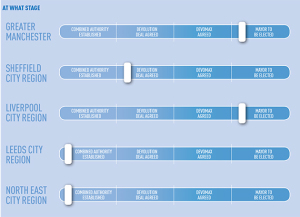 Next Thursday ought to see celebrations across the North. It marks the day a slogan was born. Yes, Northern Powerhouse will be two years’ old next week.
Next Thursday ought to see celebrations across the North. It marks the day a slogan was born. Yes, Northern Powerhouse will be two years’ old next week.
Things have moved fast since 23 June 2014, when chancellor George Osborne stood in the Power Hall at Manchester’s Museum of Science and Industry. “The cities of the North are individually strong, but collectively not strong enough. The whole is less than the sum of its parts,” he declared. “The powerhouse of London dominates more and more. We need a Northern Powerhouse too.”
Today, after dozens of conferences, hundreds of initiatives and many gigabytes of data and analysis, are we any nearer to learning what the Northern Powerhouse will look like, and how it will work?
One answer is increasingly clear. The Northern Powerhouse is not primarily about big-ticket transport projects to weld the northern cities together. Infrastructure will be important, but property people hoping it will turn into a Crossrail for the North bonanza will be disappointed.
This is going to take years, and the property outcomes will not come in a simple, easy-to-identify package.
That’s because while Northern Powerhouse started out as a conversation about new high-speed rail lines and road upgrades, it’s since turned into something more nuanced.
According to most observers, it’s about a political and strategic coming together which will then generate new economic plans and, only then, suitable infrastructure projects.
Nobody has more fingers in northern pies than Paul Sargent, operations director at Queensberry Real Estate. Today he is bidding to become developer of the £500m Sheffield retail quarter, paid £18m for Liverpool’s Met Quarter, has revamped Manchester’s Corn Exchange and is now working on Barnsley’s regeneration plans. He says Northern Powerhouse comes with a clue in the name: power.
“This is all about city regions having more control of their future. Greater Manchester was already turning into a powerhouse, and when Westminster sees an example of power being used like that, they thought it would be better to have them working with you than against you. George Osborne saw the writing on the wall,” says Sargent.
“Northern Powerhouse and the new city regions and city mayors are a stepping stone, a foundation for regionalisation and devolution. It puts the responsibility of local authorities to re-animate their areas, so does devolution to the city regions.
“The cities need to get to a place where they can make hard choices, where astute dynamic officers and members come up with ideas, and are brave enough to act on them.”
This is a widely held view. Matthew Scrimshaw, northern region head at Lambert Smith Hampton, says: “Northern Powerhouse is about the devolution agenda – so much so that John Prescott says it is really his idea, he thought of it first in 2004. Northern Powerhouse is not a new idea, but it is a new slogan.”

The difficulty is that not every city region is well-placed to take up the challenge. “It is questionable whether some city regions can do this. There are issues of the quality of leadership. Are there enough qualified people? Then there are issues of geography and history – not everyone has Manchester’s advantage of a massive airport. There will certainly be uncomfortable rides for some city regions,” says Sargent. Liverpool, West Yorkshire and the North East are making slowest progress (see graphic).
Work on the detailed economic study that will guide decision-making will be completed soon. This analysis will be key to the success or failure of the Northern Powerhouse economies (see panel). Meanwhile, Osborne has created Transport for the North to oversee infrastructure projects and allocated £60m to help plan the HS3 high-speed rail line to connect the northern cities, along with funding for more modest plans to improve lines on the Leeds-Manchester-Sheffield triangle. Another £75m has been set aside to investigate a 35-mile road tunnel under the Pennines from Manchester to Sheffield.
However, the real gains are intangible. The pressure of public expectation has helped smooth over age-old rivalries. Liverpool is talking to Manchester, and pleasantries have been exchanged between Manchester and Leeds.
In the wider world, the Northern Powerhouse is already changing perceptions and diverting capital flows.
Rob Brook, head of portfolio management at Patrizia, is bidding to develop Manchester’s 24-acre Mayfield regeneration. He says: “The key to the Northern Powerhouse could be how it projects the North beyond our shores. It’s already attracting investment from occupiers and investors overseas. It’s given the process of looking beyond London a label, and accelerated it.”
Queensberry’s Sargent says: “Northern Powerhouse is a hook and is massive help to create confidence when you go out into the funding market. It makes people sit up and look at the regions.”
Heath Thomas, Royal Bank of Scotland’s head of real estate in the North West, sees the same positive results.
“In Greater Manchester, the lending on housing is huge – whether PRS or for sale – and a lot of that links back to talk about the Northern Powerhouse. The idea is adding to the momentum,” he says of the “at least eight-figure” loan book he says the Northern Powerhouse has helped inspire.
“Yes, there are challenges to Northern Powerhouse – it is so commonly used as a buzzword it makes you wonder what the substance is – but it is already about collective firepower and a single brand on the world stage,” he says.
There’s still an enormous amount of work to turn George Osborne’s catchphrase into a political and economic reality – and many potential pitfalls to overcome (see sidepanel). But things are changing.
Thomas says: “Northern Powerhouse isn’t just going to work in 12-18 months. It’s going to take 10-15 years. And the business community has got to see that as their responsibility. This isn’t just an issue for government and local councils. Business can’t just wait and complain they can’t see what’s happening. They have to see the opportunities and grasp them.”
So two-and-a-half cheers for the Northern Powerhouse – and now it’s over to you.
Northern nitty gritty
Each city region could have different powers but Greater Manchester’s devolution deal – effective from April 2017 – includes including the development of a statutory spatial framework for the city region, the power to designate mayoral development corporations, compulsory purchase powers and the power to implement a community infrastructure levy. There will be a new Manchester land commission to oversee the efficient utilisation of the public estate.
Friends in the North
George Osborne’s original vision for a Northern Powerhouse seemed clear. But not everyone takes Osborne at face value.
Oldham Labour MP and hotly tipped future party leader Jim McMahon says: “Osborne isn’t doing anywhere near enough to rebalance the economy from the South East. The two issues of English devolution and the rebalancing of the economy have been conflated and confused. The project is in danger of falling over – because it wasn’t a genuine effort to rebalance the economy, but a Conservative leadership pitch – and for his own credibility he needs to work on this.
“For now the power is being redistributed within government – from other ministries to the Treasury – and the Treasury sees the city-regions as their delivery agents.”
In numbers
£300bn
today’s Northern Powerhouse GVA
£56.6bn
estimated annual growth in GVA by 2040, if Northern Powerhouse works
90 minutes
average train journey time between core cities
15.4m
total population of the North
11m
total workforce
Source: Transport for the North, March 2016; Bilfinger GVA Northern Powerhouse: Realising it’s full potential Spring 2016
How it will work
The Northern Powerhouse Independent Economic Review, due to be published as EG went to press, is expected to suggest four main areas for growth – advanced manufacturing, energy, health innovation and digital technology – backed by three “key enabling capabilities” (financial and professional services, logistics and higher education). The report will say transport capacity is restraining growth, particularly around Greater Manchester.
Eamonn Boylan, chief executive at Stockport Council and one of the architects of the Northern Powerhouse, says: “We need a clear, hard-headed analysis of what our assets are, where places have a contribution to make, and we’re not in the business of rebadging old initiatives with ‘Northern Powerhouse’.
“But we’re not going to label and say, ‘This city specialises in this subject, go away and do it.’ We will use the evidence to drive specific projects. It is not about enforcing roles – saying you are a digital hub, you are knowledge capital. We will focus on the evidence and that will persuade.”
Some think the lack of a formal, statutory planning document for the North is a weakness. WYG director Nolan Tucker says: “It would be logical to have a planning document at the northern level. You could put together a Great North Plan today, but it would be more of an investment prospectus.”
Boylan disagrees. “The lack of a North-wide planning process is not a problem, it’s just life. We are not looking to create a spatial framework at that level at all. It was never remotely the idea.”
Power off – what could stall the Northern Powerhouse
Life after George: If the EU referendum results in Brexit, Osborne’s career is over – and it could be over anyway if rival Boris Johnson ends up as Tory leader. Either way, his pet project could be toast. Is the momentum behind the Northern Powerhouse idea now too strong to derail? “The train has already left the station,” says Patrizia’s Rob Brook.
Toxic white elephants: “Backing the wrong project on infrastructure could bring the whole thing crashing down – a white elephant would be a disaster,” says Lambert Smith Hampton’s Matthew Scrimshaw. The £6bn Sheffield-Manchester road tunnel is top candidate for the undeliverable toxic mega-scheme that poisons the Northern Powerhouse idea.
Not enough devolution: If the North is promised real control but does not get it, credibility will sink like a stone. Oldham MP Jim McMahon says: “It will only work if we have the freedom and responsibility to do it properly.”
Nobody is in charge: Who will make sure each city region plays to its real strengths and doesn’t duplicate what other cities are doing? JLL’s Jeff Pearey says: “ I can only see this working if the key cities agree to promote certain things each and not others, otherwise the risk is everyone will want to do everything.”











